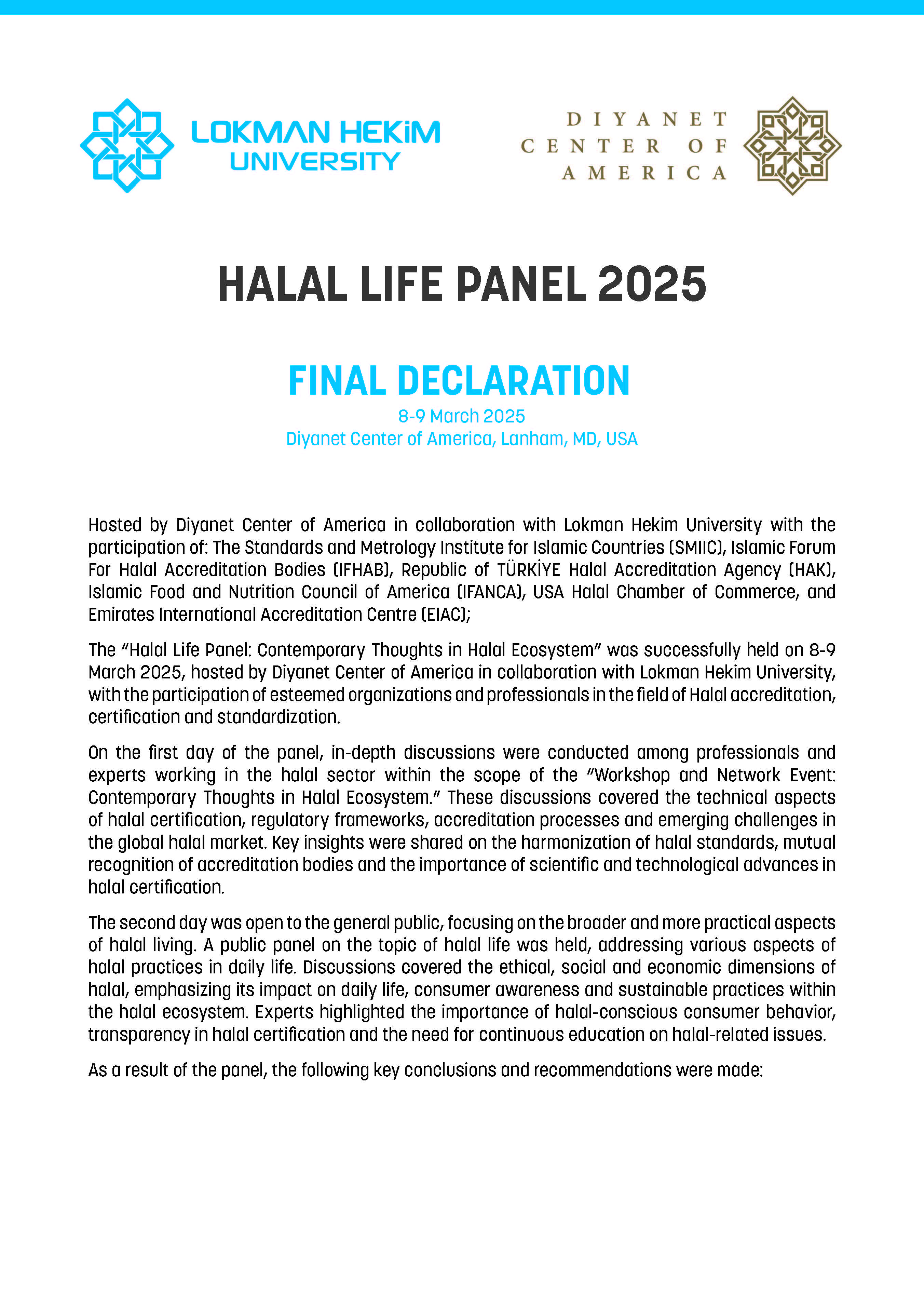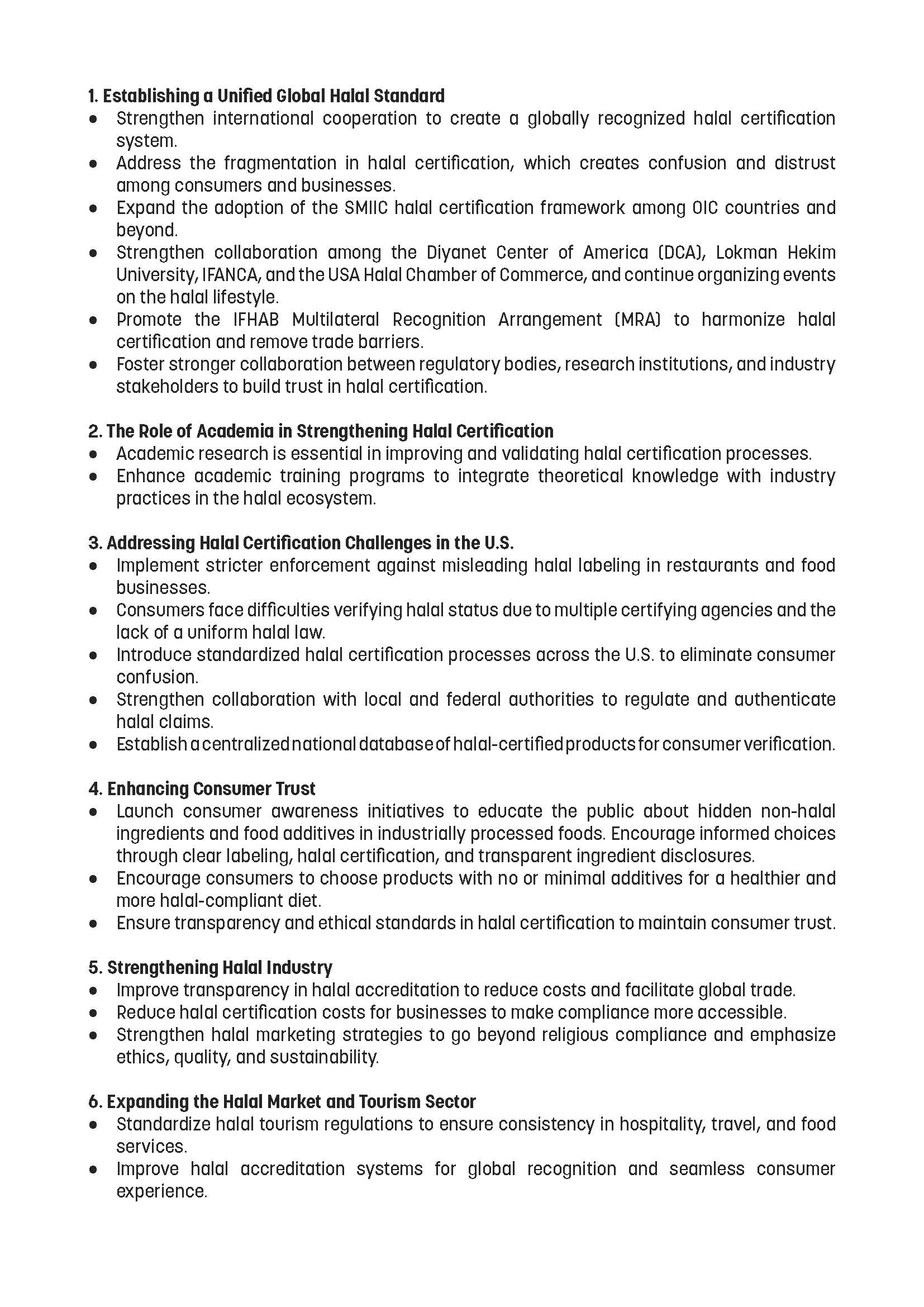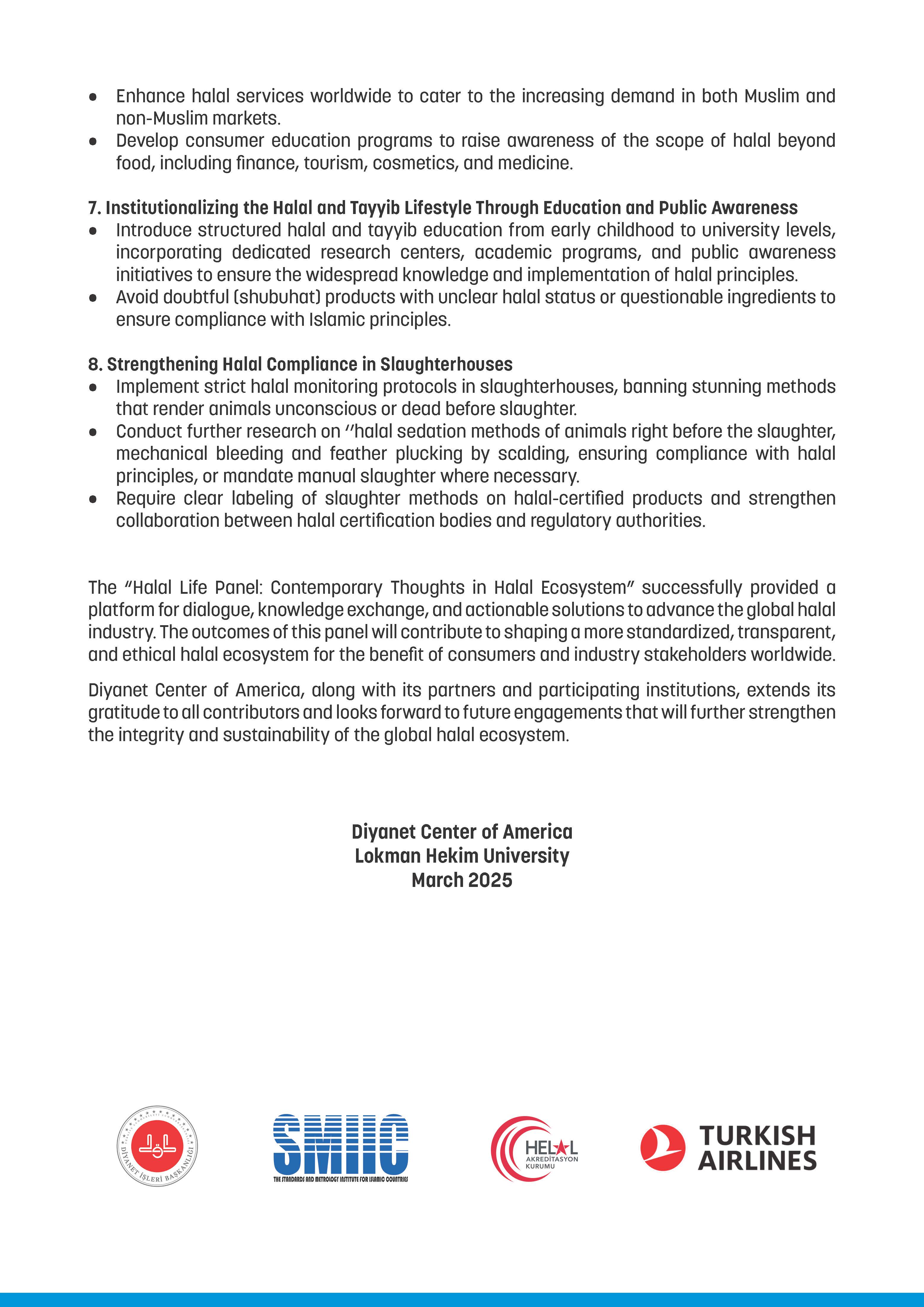Helal Life 2025
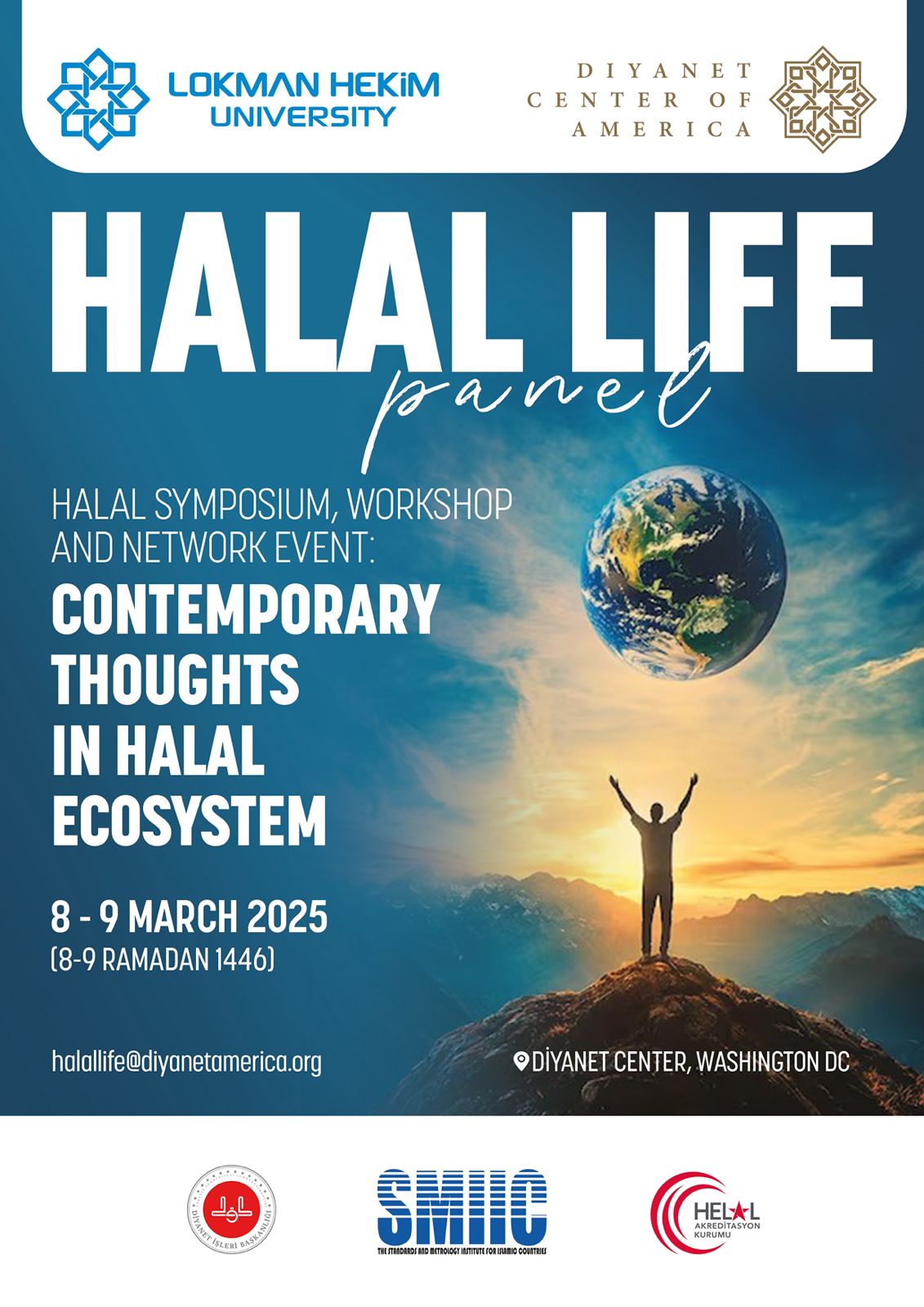
Program

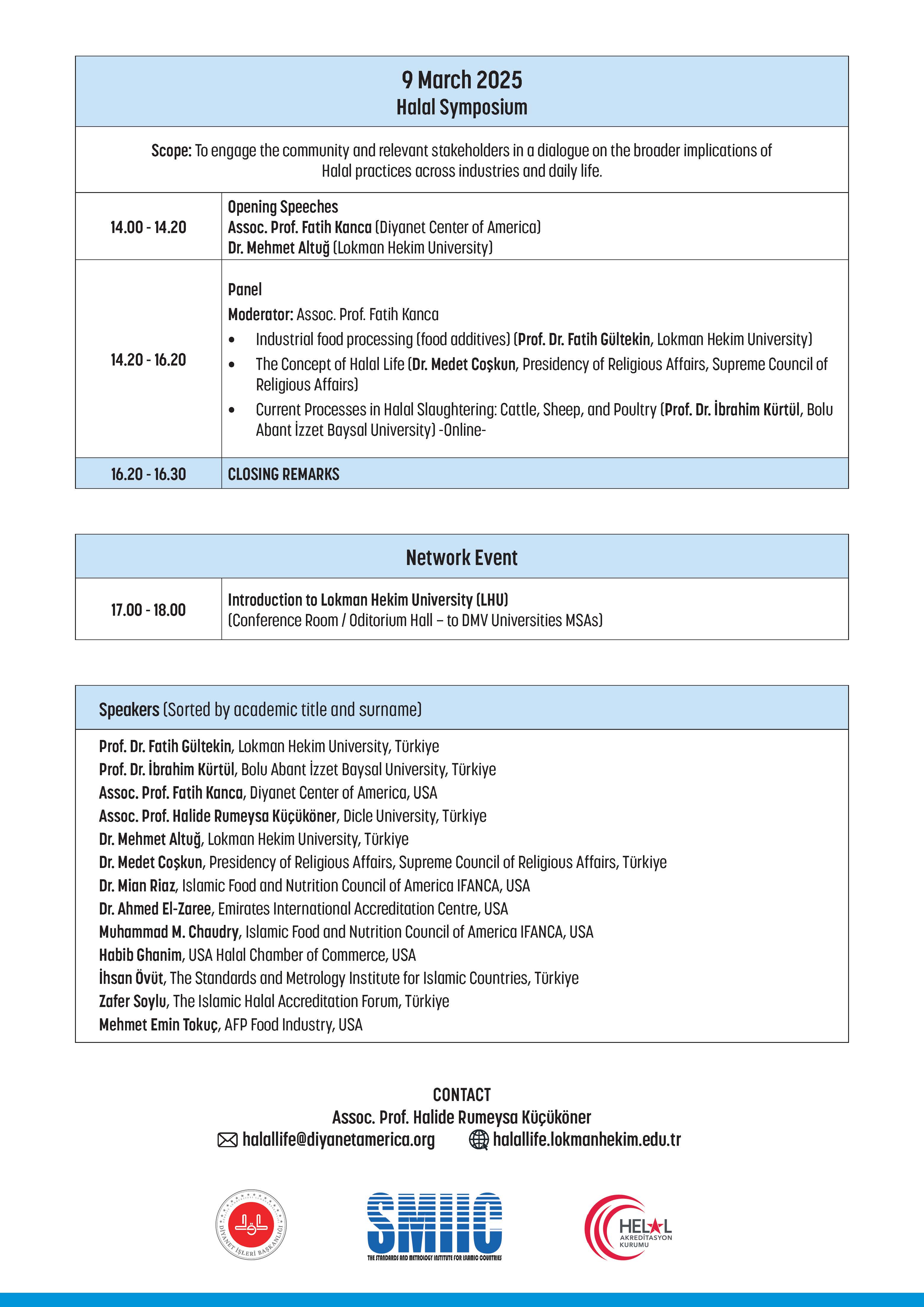
DAVET
Değerli Akademisyenler,
Helal bir yaşam tarzı Müslümanlar için hayati bir dini ilkedir ve hem yenilebilir hem de yenilebilir olmayan, hayatta kalmayı, refahı ve yaşam kalitesini destekleyen çok çeşitli temel ürün ve hizmetleri kapsar. Bu yaşam tarzı, Müslümanlar için bir temel oluşturmanın ötesinde, dünya çapındaki gayrimüslimlere de değerli fırsatlar sunmaktadır. Köklerini doğallıktan ve insan doğasından alan bu yaşam tarzı, günlük yaşamda sağlık, temizlik ve sürdürülebilirliği vurgularken varoluş amacına da uygun düşmektedir. Bu yaklaşım COVID-19 salgını sırasında daha da önem kazanarak temizliğin, güvenlik standartlarının ve doğal insan davranışlarının önemini vurgulamıştır.
Helal ürün ve hizmetler sadece İslam hukukunun yüksek hedeflerine hitap etmekle kalmıyor, aynı zamanda iki önemli küresel çerçeveye de uyum sağlıyor: Birleşmiş Milletler'in Sürdürülebilir Kalkınma Hedefleri (SKH'ler) ve Çevresel, Sosyal ve Yönetişim (ÇSY) ilkeleri. Bu dinamikler ışığında, Türkiye'nin ilk ve tek Helal Ürün Uygulama ve Araştırma Merkezi'ne ev sahipliği yapan Lokman Hekim Üniversitesi, Türkiye Cumhuriyeti Diyanet İşleri Başkanlığı, Amerika Diyanet Merkezi (DCA), İslam Ülkeleri Standartlar ve Metroloji Enstitüsü (SMIIC) ve Helal Akreditasyon Kuruluşları İslam Forumu (IFHAB) işbirliğiyle "Helal Sempozyumu, Çalıştayı ve Ağ Etkinliği: Helal Ekosisteminde Çağdaş Düşünceler “ 8-9 Mart 2025 tarihlerinde DCA'nın Lanham, MD kampüsünde gerçekleştirilecektir.
Bu etkinlik, hem Türkiye'den hem de ABD'den akademisyenleri, STK'ları, helal belgelendirme kuruluşlarını ve sektör liderlerini bir araya getirerek helal belgelendirme ve sektörün karşılaştığı zorluklara ilişkin iki taraflı anlayışları geliştirmeyi amaçlamaktadır. Sempozyum, günümüzün dijitalleşen dünyasında helal kavramlarının önemini vurgulayarak, helal uygulamaların endüstriler ve günlük yaşam üzerindeki geniş etkileri üzerine diyaloğu teşvik etmeyi amaçlamaktadır. Helal yaşam tarzının akademik, etik, yasal, sosyal ve vicdani boyutlarını vurgulayarak, bu yaşam tarzının sadece Müslümanlar için gerekli olmadığını, aynı zamanda küresel olarak tüm insanlar için “güvenli bir sığınak” görevi gördüğünü göstermeyi amaçlıyoruz.
Bu sempozyumun tartışmalarının ve sonuçlarının, helal yaşam tarzını benimsemiş bireyler için değerli bilgiler ve veriler sağlayacağına inanıyoruz. Sempozyumun sonuç bildirgesinin pratik rehberlik sağlaması ve helal ilkelerin modern yaşamın her alanında yaygınlaştırılması için bir yol haritası işlevi görmesi beklenmektedir.
Sizi bu önemli etkinlikte bize katılmaya ve helal ekosisteminin geleceğini şekillendirecek diyaloğa değerli uzmanlığınızla katkıda bulunmaya davet ediyoruz.
Saygılarımızla
Organizasyon Komitesi
Komiteler
Başkanlar
- Doç. Dr. Fatih KANCA (Başkan, Diyanet Center of America)
- Dr. Fatih GÜLTEKİN (Rektör, Lokman Hekim Üniversitesi)
Onur Kurulu
- Dr. Ali ERBAŞ (Başkan, Diyanet İşleri Başkanlığı, Türkiye Cumhuriyeti)
- Doç. Dr. Fatih KANCA (Başkan, Diyanet Center of America)
- Dr. Mehmet ALTUĞ (Mütevelli Heyet Başkanı, Lokman Hekim Üniversitesi)
- Dr. Fatih GÜLTEKİN (Rektör, Lokman Hekim Üniversitesi)
- İhsan ÖVÜT (Genel Sekreter, İslam Ülkeleri Standartlar ve Metroloji Enstitüsü - SMIIC)
- Zafer SOYLU (Yönetim Kurulu Başkanı, Helal Akreditasyon Kurumu, Türkiye Cumhuriyeti)
Organizasyon Komitesi (Soy Adına Göre)
- Dr. Mehmet ALTUĞ (Lokman Hekim Üniversitesi)
- Doç. Dr. Selim ARGUN (Diyanet İşleri Başkanlığı)
- Dr. Medet COŞKUN (Diyanet İşleri Başkanlığı, Din İşleri Yüksek Kurulu)
- Doç. Dr. Huzeyfe ÇEKER (Chicago Sosyal ve Din Hizmetleri Ataşeliği)
- Prof. Dr. Fatih GÜLTEKİN (Lokman Hekim Üniversitesi)
- Doç. Dr. Fatih KANCA (Diyanet Center of America)
- Prof. Dr. Zeliha Tufan KOÇAK (Ankara Yıldırım Beyazıt Üniversitesi)
- Prof. Dr. İbrahim KÜRTÜL (Bolu Abant İzzet Baysal Üniversitesi)
- Doç. Dr. Halide Rumeysa KÜÇÜKÖNER (Dicle Üniversitesi)
- İhsan ÖVÜT (The Standards and Metrology Institute for Islamic Countries - SMIIC)
- Zafer SOYLU (İslami Helal Akreditasyon Forumu)
- Dr. Ahmed EL-ZAREE (Emirates Uluslararası Akreditasyon Merkezi)
Akademik Sekreterlik
- Doç. Dr. Halide Rumeysa KÜÇÜKÖNER
Kapsamlı İnceleme
Tartışmalar, helal sertifikasyonunun standardizasyonu ve uyumlaştırılmasının, özellikle birden fazla sertifikasyon kuruluşunun ve düzenleyici denetim eksikliğinin olduğu bölgelerde, ticaret engellerini ve tüketici güvensizliğini ortadan kaldırmada hayati önem taşıdığını güçlendirdi . Ayrıca, akademinin rolü , bilimsel gelişmelerin dini ve etik ilkelerle uyumlu olmasını sağlayarak , araştırmaya dayalı helal doğrulamayı güçlendirmede önemli bir bileşen olarak vurgulandı .
İleriye doğru, çeşitli sektörlerdeki paydaşların (hükümet yetkilileri, dini kurumlar, akademik araştırmacılar ve endüstri liderleri) sürdürülebilir, etik ve yaygın olarak kabul gören helal standartlarını geliştirmek için iş birliği yapması gerektiği açıktır . Panel, tüketici eğitimini geliştirmek, helal sertifikasyonunda şeffaflığı artırmak ve İslami diyet ve etik ilkelerinin bütünlüğünü korurken helal pazarlarını küresel olarak genişletmek için harekete geçme çağrısıyla sona erdi .
Yeniliğin, düzenleyici uyumun ve sınır ötesi iş birliğinin teşvik edilmesiyle helal ekosisteminin geleceği, güvenilir, kapsayıcı ve etik açıdan sağlam bir küresel standart olarak güvence altına alınabilir .
Birleşik Helal Ekosistemine Doğru: Helal Yaşam Paneli'nden Önemli Görüşler
Halal Life Panel 2025'te , sektörden uzmanlar, din alimleri, akademisyenler ve kilit paydaşlar küresel helal ekosistemindeki zorlukları ele almak için bir araya geldi. Aşağıdaki temel öncelikler ve uygulanabilir öneriler konusunda fikir birliğine vardılar:
1. Birleşik Küresel Helal Standardının Oluşturulması
✔ Küresel çapta tanınan bir helal sertifikasyon sistemi oluşturmak için uluslararası iş birliğini güçlendirmek.
✔ Tüketiciler ve işletmeler arasında karışıklığa ve güvensizliğe yol açan helal sertifikasyondaki parçalanmayı giderin.
✔ SMIIC helal sertifikasyon çerçevesinin İslam İşbirliği Teşkilatı (İİT) ülkeleri ve diğer ülkelerde benimsenmesini yaygınlaştırmak.
✔ Amerika Diyanet Merkezi (DCA), Lokman Hekim Üniversitesi, IFANCA ve ABD Helal Ticaret Odası arasındaki iş birliğini güçlendirmek ve helal yaşam tarzına ilişkin etkinlikler düzenlemeye devam etmek.
✔ Helal sertifikasyonunu uyumlu hale getirmek ve ticaret engellerini kaldırmak için IFHAB Çok Taraflı Tanıma Düzenlemesi'ni (MRA) teşvik etmek.
✔ Helal sertifikasyonuna olan güveni artırmak için düzenleyici kurumlar, araştırma kurumları ve endüstri paydaşları arasında daha güçlü bir iş birliğini teşvik edin.
2. Helal Sertifikasyonun Güçlendirilmesinde Akademinin Rolü
✔ Helal sertifikasyon süreçlerinin iyileştirilmesi ve geçerliliğinin sağlanmasında akademik araştırmaların önemi büyüktür.
✔ Helal ekosisteminde teorik bilgiyi sektör uygulamalarıyla bütünleştirmek için akademik eğitim programlarını geliştirmek.
3. ABD'de Helal Sertifikasyon Zorluklarının Ele Alınması
✔ Restoranlarda ve gıda işletmelerinde yanıltıcı helal etiketlemeye karşı daha sıkı yaptırımlar uygulayın.
✔ Tüketiciler, birden fazla sertifika kuruluşunun olması ve tek tip bir helal yasasının olmaması nedeniyle helal statüsünü doğrulamada zorluklarla karşılaşıyor.
✔ Tüketicilerin kafa karışıklığını ortadan kaldırmak için ABD genelinde standartlaştırılmış helal sertifikasyon süreçlerini hayata geçirin.
✔ Helal iddialarını düzenlemek ve doğrulamak için yerel ve federal yetkililerle iş birliğini güçlendirmek.
✔ Tüketici doğrulaması için helal sertifikalı ürünlerin merkezi ulusal veri tabanını oluşturmak.
4. Tüketici Güvenini Artırmak
✔ Endüstriyel olarak işlenmiş gıdalardaki gizli helal olmayan içerikler ve gıda katkı maddeleri hakkında kamuoyunu eğitmek için tüketici farkındalığı girişimleri başlatın. Net etiketleme, helal sertifikasyonu ve şeffaf içerik açıklamaları yoluyla bilinçli tercihleri teşvik edin.
✔ Tüketicileri daha sağlıklı ve helal uyumlu bir beslenme için hiçbir katkı maddesi içermeyen veya minimum düzeyde katkı maddesi içeren ürünleri seçmeye teşvik edin.
✔ Tüketici güvenini korumak için helal sertifikasyonunda şeffaflığı ve etik standartları sağlayın.
5. Helal Endüstrisinin Güçlendirilmesi
✔ Maliyetleri azaltmak ve küresel ticareti kolaylaştırmak için helal akreditasyonunda şeffaflığı artırın.
✔ İşletmelerin helal sertifikasyon maliyetlerini azaltarak uyumluluğu daha erişilebilir hale getirin.
✔ Helal pazarlama stratejilerini dini uyumluluğun ötesine taşıyarak etik, kalite ve sürdürülebilirliği vurgulayacak şekilde güçlendirmek.
6. Helal Pazar ve Turizm Sektörünün Genişletilmesi
✔ Misafirperverlik, seyahat ve yiyecek hizmetlerinde tutarlılığı sağlamak amacıyla helal turizm düzenlemelerini standart hale getirin.
✔ Küresel tanınırlık ve kusursuz tüketici deneyimi için helal akreditasyon sistemlerini geliştirin.
✔ Müslüman ve gayrimüslim pazarlardaki artan talebi karşılamak için dünya çapında helal hizmetlerini geliştirmek.
✔ Helal kavramının gıdanın ötesinde finans, turizm, kozmetik ve tıp gibi alanları da kapsayan kapsamı konusunda farkındalığı artırmak için tüketici eğitim programları geliştirmek.
7. Eğitim ve Kamu Bilinci Yoluyla Helal ve Tayyib Yaşam Tarzının Kurumsallaştırılması
✔ Erken çocukluktan üniversite düzeyine kadar yapılandırılmış helal ve tayyib eğitimini, helal prensiplerinin yaygın olarak bilinmesini ve uygulanmasını sağlamak amacıyla özel araştırma merkezleri, akademik programlar ve kamuoyu bilinçlendirme girişimleri ile birlikte sunmak.
✔ İslami esaslara uygunluğu sağlamak için helal durumu belirsiz veya içeriği şüpheli olan şüpheli ürünlerden uzak durun.
8. Mezbahalarda Helal Uygunluğunun Güçlendirilmesi
✔ Mezbahalarda sıkı helal izleme protokolleri uygulayın, hayvanları kesimden önce bayıltıp öldüren sersemletme yöntemlerini yasaklayın.
✔ Mekanik kanatma ve haşlama yoluyla tüy yolma konusunda daha fazla araştırma yapılmalı, helal esaslara uyulması sağlanmalı veya gerektiğinde elle kesim zorunlu kılınmalıdır.
✔ Helal sertifikalı ürünlerde kesim yöntemlerinin açıkça etiketlenmesini zorunlu kılmak ve helal sertifika kuruluşları ile düzenleyici otoriteler arasındaki iş birliğini güçlendirmek.
Sonuç Bildirisi
